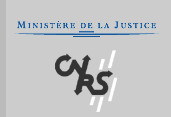



| |
|
|
|
|
|
|
|
|
|
|
|
|
|
|
|
|
|
|
||||||
| |
 |
|
||||||||||||||||||||||
| |
 |
 |
|
 |
|
|||||||||||||||||||
| |
|
|
|
|
||||||||||||||||||||
| |
|
|
|
|||||||||||||||||||||
| |
|
|||||||||||||||||||||||
| |
|
|||||||||||||||||||||||
| |
||||||||||||||||||||||||
| |
|
|
|
|||||||||||||||||||||
| |
|
|||||||||||||||||||||||
 |
Membres du CESDIP habilités à diriger des recherches (HDR) |
 |
Le programme de recherches du CESDIP pour la période 2006-2007 |
 |
Réseau thématique de l’Association Française de Sociologie (AFS) |
|
|
|||||
 |
|
PSYCHOLOGICAL EXPERTISE, RISK MANAGEMENT AND POWER RELATIONS IN CANADIAN PRISONS
par Gilles CHANTRAINE, Marion VACHERET, Gilles CHANTRAINE (CESDIP, Guyancourt, France) and Marion VACHERET (International Centre for Comparative Criminology, Montreal, Canada) have jointly conducted field work aimed at studying social relations in Canadian prisons. The present paper discusses one particular aspect of their research : the concrete impact of psychological expertise and of management of the risk of recidivism on the economy of interpersonal relations in prison. Their analyses thus feed current debate in France on how to deal with recidivism.
The Canadian federal prison configuration is somewhat remarkable ; like Scandinavian prisons in the 1970s and 80s, it sometimes serves as a “model” for reformers of other national correctional systems. In France for instance, where controversy is raging over the need both to “deal more adequately” with recidivism and to reform correctional facilities, the extreme deterioration of which is repeatedly denounced, one often hears explicit or implicit references to the practices and methods used in Canadian prisons, as applied both to conditions of detention and inmates’ rights and to new (re)habilitation schemes.
The present issue of Penal Issues does not aim to describe the Canadian correctional system as a whole, with the development of inmates’ rights over nearly thirty years, the significant opening-up of prisons to all sorts of actors in the legal, administrative, political and citizens group fields, the promotion and strengthening of what is known as “active” security via the involvement of guards in a detention model based on communication and personalized relationships or again, the diversification of adjustment measures and the ambiguities of the means of obtaining them. We prefer to focus here on one peculiar aspect of the system : psychological expertise and its concrete impact on detention.
The point here is not to observe this expertise from the viewpoint of an evaluator attempting to assess the efficacy of programs, using increasingly refined statistical tools to measure the rates of recidivism and of returns to prison. Rather, we take a sociologist’s view of social relations in detention. This focus on these institutional aspects, and our peculiar viewpoint, are by no means fortuitous : they correspond to a specific gap in French public debate. Indeed, when French reformers suggest that we “set up an interdisciplinary methodology combining psychiatric, medico-psychological and behavioral expertise of sentenced individuals so as to detect their risk of recidivism and social dangerousness, as is done in Canada”, this invocation and the projected introduction of the imported scheme are divested of most of the critical reflections that these schemes have attracted. More traditionally, this desire to import a solution is carried out without any attempt to understand how such programs shape prisoners’ personal experience of detention. Our conviction that there can be no analysis or understanding of how prisons function without that “underdog perspective” has led us to weight the other side of the balance so as to achieve a degree of equilibrium, essential to public debate.
|
||||
|
mars 2007 PRISON ENTRIES AND LENGTH OF DETENTION. THE DIVERSITY OF THE CORRECTIONAL SYSTEMS SITUATION IN EUROPE janvier 2007 VICTIMISATION AND POLICE STATISTICS IN THE ÎLE-DE-FRANCE REGION décembre 2006 VICTIMIZATION AND INSECURITY IN URBAN AREAS. THE 2005 SURVEYS septembre 2006 VIOLENCE IN PRIMARY SCHOOLS, AS EXPERIENCED BY TEACHERS AND PUPILS juin 2006 RELATIVITY OF AND GAPS IN SOURCES OF STATISTICS ON PRETRIAL DETENTION janvier 2006 SOME ASPECTS OF VIOLENCE IN SOCIAL RELATIONS DELIBERATE ASSAULT AND BATTERY ENTAILING INCAPACITY TO WORK TRIED BY A PARIS AREA CORRECTIONNEL COURT IN THE YEAR 2000 décembre 2005 SITUATIONAL CRIME PREVENTION IN PUBLIC HOUSING : LETTER FROM AMERICA juin 2005 A COMPARATIVE STUDY OF PRISON LABOUR IN FRANCE, GERMANY AND ENGLAND mars 2005 WHEN THE POLICE GO TO COURT. A STUDY OF CONTEMPT, OBSTRUCTION AND ASSAULT ON A POLICE OFFICER janvier 2005 A RESEARCH ON GANG RAPE CASES : JUDICIAL DATA AND SOCIOLOGICAL ANALYSIS décembre 2004 PREVENTIVE POLICY FOR DRUG USERS : STRAINED NORMS septembre 2004 LEAVING SCHOOL, A NEW FORM OF JUVENILE DEVIANCE ? juin 2004 OF WHAT USE ARE LAWYERS FOR JUVENILE OFFENDERS ? mars 2004 IMPOSSIBLE INTERNATIONAL COMPARISONS OF STATISTICS ? THE EUROPEAN SOURCEBOOK EXPERIENCE janvier 2004 CRIMINAL INVESTIGATIONS IN HOMICIDE CASES décembre 2003 FRENCH COURT CLERKS : UNCERTAINTIES IN TURNING THE JOB INTO A PROFESSION septembre 2003 COMBATTING MONEY LAUNDERING AT THE EUROPEAN LEVEL juin 2003 ELECTRONIC MONITORING : ASSESSMENT OF THE EXPERIMENTAL PHASE janvier 2003 THE CUSTOMS DEPARTMENT AS ACTOR ON THE CRIMINAL JUSTICE SCENE |
|